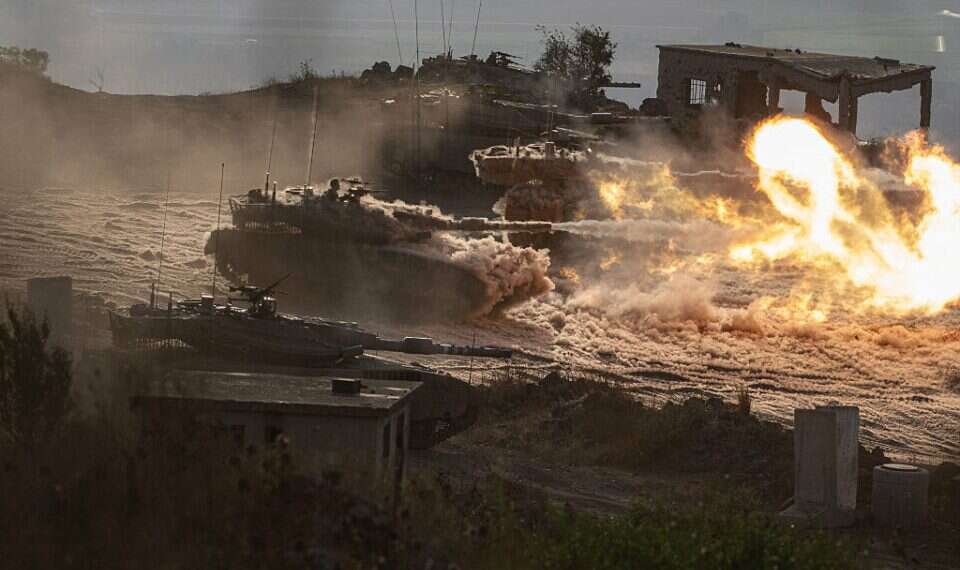by Shlomi Diaz , Lilach Shoval and Daniel Siryoti
PM, defense minister monitoring situation. Military says one rocket landed in Lebanon, one was intercepted by a local Iron Dome defense system battery, and one hit an open area near Kiryat Shmona, sparking a small fire.
 |
| IDF tanks during training in the Golan Heights, July 20, 2021 | File photo: Eyal Margolin / JINI |
Three rockets were fired at northern Israel from Lebanon on Wednesday afternoon, triggering sirens in communities near the border and a quick response from IDF forces that continued in intervals over several hours.
By the Wednesday evening, it appeared that the flare-up was over, with the IDF reporting that it had fired three salvos in response to the rockets.
The escalation started around noon when the IDF confirmed rocket fire from across the border triggered air raid sirens in Kiryat Shmona, Kfar Giladi, Tel Hai, and the Golan Heights. One rocket landed in Lebanon, one was intercepted by a local Iron Dome defense system battery, and one hit an open area near Kiryat Shmona, sparking a small fire.
Israeli forces responded with artillery fire towards the origin of the fire, across the Lebanese border, the army said. The artillery fire was reportedly resumed about an hour later, with residents in northern Israel saying they heard more shelling toward Lebanon.
Magen David Adom emergency service said no injuries were reported in the incident but four people suffered shock.
The Home Front Command has instructed residents in the area to remain indoors but later the government clarified that no special instructions have been issued.
Prime Minister Naftali Bennett, Defense Minister Benny Gantz, and IDF Chief of Staff Lt. Gen. Aviv Kochavi were briefed on the incident and have called in top officials for a security consultation.
The IDF issued a statement on Twitter saying that "the government of Lebanon bears full responsibility for any rocket fire from its territory toward Israel. There is a lack of governance in Lebanon over terrorist elements, and Israel will not tolerate any rocket fire against it under any circumstance."
The United Nations Interim Force in Lebanon said its Head of Mission and Force Commander, Major General Stefano Del Col, was in contact with both parties.
"He urged them to cease fire and to exercise maximum restraint to avoid further escalation, especially on this solemn anniversary," UNIFIL said in a statement.
The border has been mostly quiet since Israel fought a 2006 war against Hezbollah, which has advanced rockets.
But small Palestinian factions in Lebanon have fired sporadically on Israel in the past, and two rockets were launched at Israel on July 20, causing no damage or injuries. Israel responded to that incident with artillery fire.
The latest border incidents occurred after an attack last Thursday, which Israel blamed on Iran, on a tanker off the coast of Oman. Two crew members, a Briton and a Romanian, were killed. Iran has denied any involvement.
Wednesday marks the one-year anniversary of the 2020 Bieurt blast. One security source noted the rocket fire could be an attempt by a Lebanese militia to capitalize on the date.
The Aug. 4 explosion, linked to a massive amount of ammonium nitrate stored at the Port of Beirut, killed 218 people, left 7,500 injured, and caused upward of $15 billion in property damage. One year on, no top officials have been held accountable.
Shlomi Diaz , Lilach Shoval and Daniel Siryoti
Source: https://www.israelhayom.com/2021/08/04/idf-shells-targets-in-lebanon-following-rocket-fire-on-israels-north/
No comments:
Post a Comment